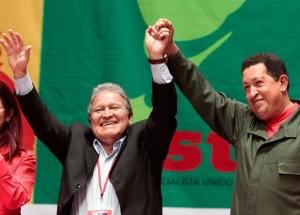EspañolIn Latin America, Socialism for the 21st Century is once again on the verge of obtaining a political victory that we will soon come to regret.
Many in the media believe Ecuador’s President Rafael Correa has found the secret formula from which socialism can grow, and few have criticized his pursuits or his plan to seek another term in office. Similarly, members of the press have almost completely forgotten to monitor the government excesses and lack of economic progress in Argentina and Bolivia. Even Cuba gained some national recognition for its organization of the second CELAC Summit.
Just last week, what should have been a defense of democracy by the continent’s leaders, became a boost for Nicolás Maduro in Venezuela. Increasingly discredited and useless, the Organization of American States (OAS) gave the Chavista regime a pat on the back and refrained from condemning the heavy-handed crackdown.
The latest affront to democracy in Latin America is the pending victory of the Farabundo Martí National Liberation Front (FMLN) in El Salvador. Although the results are not official, all signs indicate that the new president will be former guerrilla Salvador Sánchez Cerén, of the FMLN, the same party in power since 2009. As of this writing, the margin of victory remains slim, with Sánchez Cerén gaining 50.08 percent of the vote, compared to 49.92 percent for Norman Quijano of ARENA.
On the one hand, Sánchez Cerén has been part of the current FMLN government under Mauricio Funes, who is not considered part of Socialism for the 21st Century. But on the other, several actions on the part of the government suggest that this model is indeed being implemented in El Salvador. First, there has been an increase in crime rates resulting from the Funes government’s inability to confront gangs known as Maras. Second, since the FMLN party came to power, there has been a clear trend toward the gradual reduction of economic freedom. Third, particular social indicators suggest the influence of the socialist chimera.

Implementation of a totalitarian agenda is not achieved over the course of a few years. In Venezuela, for example, it has taken 15 years for Cuban policies like the ration card to come into force. Similarly, it is not until now that we are beginning to see the effects of previous economic decisions in the country’s current social instability and the government’s repressive response.
In this sense, we are able to observe that each government advances at its own pace. For example, the government of Rafael Correa today can be seen as less radical, because its fall has been less dramatic than in Venezuela. However, that doesn’t mean it isn’t brewing.
Every leader has his own personality. Unlike Funes, Sánchez Cerén was actually a rebel fighter and not just a supporter of the FMLN. He claims that he plans to model his government in the style of Pepe Mujica of Uruguay, but that is doubtful. To provide clarity on his beliefs, Sánchez Cerén wrote a book in which he professed his admiration for social engineering and the construction of the perfect socialist utopia. He further casts doubt on his democratic intentions by writing within this same introduction, that “I will look beyond the 2014-2019 period, for the hope that I wish to embody and empower is something that must be built over a longer period of time.”
It is possible that these words are only prose. However, Latin America’s history of leaders with ideas similar to that of Sánchez Cerén’s suggests that, in reality, his words reveal an intent on obtaining absolute power. Further, among his proposals, many of which focus on social issues — jobs, computers for children, a digital university, respect for women — include his decision to join the Petrocaribe. This is clearly an attempt to align his government under the tutelage and protection of the Venezuelan regime.
Despite its obvious economic failure and its tendency toward totalitarianism, this model continues to reap political success across the international arena and in countries like El Salvador. As previously mentioned within these pages, what is at stake in this Central American country is not just government proposals, but a decision between a strengthening of democracy or a deeper fall into the pit of socialism. At the moment, it appears that a majority in El Salvador, if even a small one, has chosen the latter. They have sacrificed liberty for the sake of economic equality and welfare, and yet, as Milton Friedman said many years ago, in the absence of liberty, these goals will never be achieved.
Translated by Guillermo Jimenez.
 Versión Español
Versión Español












